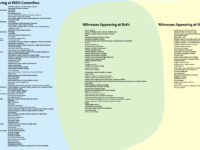The Canadian government often talks about the importance of privacy, but actions speaks louder than words. Not only has privacy reform clearly not been a priority, but the government seems more than willing to use the weak privacy rules to further other policy goals. There is an obvious price for the government’s indifference to privacy safeguards and it is paid by millions of Canadians when major privacy incidents (think Tim Horton’s or Home Depot) result in no substantive changes and no urgency for reform from the government. Indeed, as I noted yesterday on Twitter, the government has managed to rush through user content regulation in Bill C-11 and mandated payments for links in Bill C-18, but somehow privacy reform in Bill C-27 has barely moved. Some of the responsibility must surely lie with Innovation, Science and Industry Minister François-Philippe Champagne, who brings high energy to everything but privacy reform, but the decision reflects on the entire government.
Post Tagged with: "heritage"
Better Data, Better Results: Comparing the Gap Between the Copyright Review and Heritage Study on the Music Industry’s Policy Proposals
My recent series reviewing the Industry Committee’s copyright review (process, evidence, witness balance, citation) was about more that just why the decision to ignore the Canadian Heritage committee study on artist remuneration was justified. The series provides a data-backed assessment of the quality of the consultation of the respective committees, which is inextricably linked to their final recommendations. The better process is important because when comparing the recommendations from the two committees, the Industry committee consistently provided deeper analysis even in areas where there was agreement. The better analysis is not a coincidence: better process generates better policy and the Industry committee engaged in broader consultations in which it heard both from more creators and more users than Heritage.
Limited Views: Why the Copyright Review Was Right To Ignore the Canadian Heritage Committee Study, Part Two
The Industry committee’s clear assertion this week as the authoritative copyright review is grounded in process since the government gave it sole responsibility for conducting the review. While my earlier posts focus on the process and the unprecedented INDU release, the committee justifiably points out that it also heard from far more witnesses through hearings and briefs than the Heritage committee. In fact, it notes that it heard from the “vast majority of stakeholders who contributed to CHPC’s study.” Working with University of Ottawa student Philip Abraham, we reviewed the witness lists, the brief submissions, and the citations by the committees to better assess claims about which committee best reflects the full spectrum of stakeholder views on copyright. This post examines who participated in the committee work and a follow-up posts will highlight the balance in the witness lists and whether the committees were listening.
The Untold Story Behind the LAC-Canadiana Digitization Plan
The need for a large-scale Canadian digitization strategy has been readily apparent for many years, with experts repeatedly pointing to the benefits that would come from improved access to Canadian history and culture. While other countries have marched ahead with ambitious projects that often incorporate historical text records, photographs, and video, Canada has fallen behind.
Library and Archives Canada, which is charged with preserving and making accessible Canada’s documentary heritage, has led the digitization effort, but most of its work over the past decade has failed to bear much fruit.
Given the past disappointments, my weekly technology law column (Toronto Star version, homepage version) notes the launch a massive new digitization project should have been a cause for celebration. Last June, the LAC and Canadiana, an alliance of public and academic libraries focused on digital preservation, announced plans to digitize and create metadata on 60 million historical Canadian documents. The documents are currently in microfiche and the project envisions digitizing the images and adding transcriptions and metadata (data about data content) to improve their searchability.
Yet as the details of the project dubbed Héritage leaked out, controversy arose with concerns that the historical documents would be placed behind a paywall that would require individual Canadians to pay monthly fees for access. That generated a significant outcry from many groups, with then-Canadian Heritage Minister James Moore assuring the House of Commons that the new head of LAC would closely examine the project.
After the outcry subsided, however, H̩ritage began to proceed largely as planned. The key supporters of the project РCanadiana, the major library associations, and the LAC Рtried to assure critics that their concerns were unfounded, promising to make the digitized microfiche copies freely available to all and restricting additional fees to value-added services such as transcription or metadata. However, newly obtained documents under the Access to Information Act raise troubling questions about public access and promises of exclusivity made by the LAC.
The Untold Story Behind the LAC-Canadiana Digitization Plan
Appeared in the Toronto Star on September 28, 2013 as The Untold Story Behind Canada’s Digitization Plan The need for a large-scale Canadian digitization strategy has been readily apparent for many years, with experts repeatedly pointing to the benefits that would come from improved access to Canadian history and culture. […]









